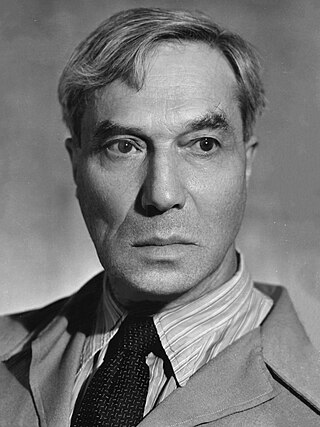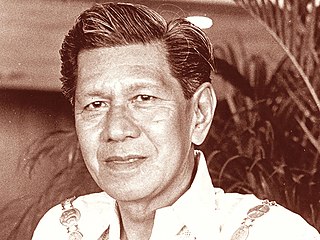
Boris Leonidovich Pasternak was a Russian poet, novelist, composer, and literary translator.
Norwegian literature is literature composed in Norway or by Norwegian people. The history of Norwegian literature starts with the pagan Eddaic poems and skaldic verse of the 9th and 10th centuries with poets such as Bragi Boddason and Eyvindr Skáldaspillir. The arrival of Christianity around the year 1000 brought Norway into contact with European medieval learning, hagiography and history writing. Merged with native oral tradition and Icelandic influence, this was to flower into an active period of literature production in the late 12th and early 13th centuries. Major works of that period include Historia Norwegie, Thidreks saga and Konungs skuggsjá.

Russian literature refers to the literature of Russia, its émigrés, and to Russian-language literature. The roots of Russian literature can be traced to the Middle Ages, when epics and chronicles in Old East Slavic were composed. By the Age of Enlightenment, literature had grown in importance, and from the early 1830s, Russian literature underwent an astounding golden age in poetry, prose and drama. Romanticism permitted a flowering of poetic talent: Vasily Zhukovsky and later his protégé Alexander Pushkin came to the fore. Prose was flourishing as well. Mikhail Lermontov was one of the most important poets and novelists. The first great Russian novelist was Nikolai Gogol. Then came Ivan Turgenev, who mastered both short stories and novels. Fyodor Dostoevsky and Leo Tolstoy soon became internationally renowned. Other important figures of Russian realism were Ivan Goncharov, Mikhail Saltykov-Shchedrin and Nikolai Leskov. In the second half of the century Anton Chekhov excelled in short stories and became a leading dramatist. The beginning of the 20th century ranks as the Silver Age of Russian poetry. The poets most often associated with the "Silver Age" are Konstantin Balmont, Valery Bryusov, Alexander Blok, Anna Akhmatova, Nikolay Gumilyov, Sergei Yesenin, Vladimir Mayakovsky, and Marina Tsvetaeva. This era produced some first-rate novelists and short-story writers, such as Aleksandr Kuprin and Nobel Prize winners Ivan Bunin, Leonid Andreyev, Fyodor Sologub, Yevgeny Zamyatin, Alexander Belyaev, Andrei Bely and Maxim Gorky.

Paul-Marie Verlaine was a French poet associated with the Symbolist movement and the Decadent movement. He is considered one of the greatest representatives of the fin de siècle in international and French poetry.

Ruth Barbara Rendell, Baroness Rendell of Babergh, was an English author of thrillers and psychological murder mysteries.

George P. Pelecanos is an American author. Many of his 20 books are in the genre of detective fiction and set primarily in his hometown of Washington, D.C. He is also a film and television producer and a television writer. On television, he frequently collaborates with David Simon, writing multiple episodes of Simon's HBO series The Wire and Treme, and is also the co-creator of the HBO series The Deuce and We Own This City.

The Kenyon Review is a literary magazine based in Gambier, Ohio, US, home of Kenyon College. The Review was founded in 1939 by John Crowe Ransom, critic and professor of English at Kenyon College, who served as its editor until 1959. The Review has published early works by generations of important writers, including Robert Penn Warren, Ford Madox Ford, Robert Lowell, Delmore Schwartz, Flannery O'Connor, Boris Pasternak, Bertolt Brecht, Peter Taylor, Dylan Thomas, Anthony Hecht, Maya Angelou, Rita Dove, Derek Walcott, Thomas Pynchon, Don Delillo, Woody Allen, Louise Erdrich, William Empson, Linda Gregg, Mark Van Doren, Kenneth Burke, and Ha Jin.

James Dover Grant, primarily known by his pen name Lee Child, is a British author who writes thriller novels, and is best known for his Jack Reacher novel series. The books follow the adventures of a former American military policeman, Jack Reacher, who wanders the United States. His first novel, Killing Floor (1997), won both the Anthony Award and the 1998 Barry Award for Best First Novel.

Nicomedes "Nick" Marquez Joaquin was a Filipino writer and journalist best known for his short stories and novels in the English language. He also wrote using the pen name Quijano de Manila. Joaquin was conferred the rank and title of National Artist of the Philippines for Literature. He has been considered one of the most important Filipino writers, along with José Rizal and Claro M. Recto. Unlike Rizal and Recto, whose works were written in Spanish, Joaquin's major works were written in English despite being literate in Spanish.
David Harsent is an English poet who for some time earned his living as a TV scriptwriter and crime novelist.

Faroese literature, in the traditional sense of the word, has only really developed in the past two hundred years. This is mainly because of the islands' isolation, and also because the Faroese language was not written down in a standardised format until 1890. Until then the Danish language was encouraged at the expense of Faroese. Nevertheless, the Faroese language soon became a vehicle for literature in its own right and has produced writers in several genres.

Jewish literature includes works written by Jews on Jewish themes, literary works written in Jewish languages on various themes, and literary works in any language written by Jewish writers. Ancient Jewish literature includes Biblical literature and rabbinic literature. Medieval Jewish literature includes not only rabbinic literature but also ethical literature, philosophical literature, mystical literature, various other forms of prose including history and fiction, and various forms of poetry of both religious and secular varieties. The production of Jewish literature has flowered with the modern emergence of secular Jewish culture. Modern Jewish literature has included Yiddish literature, Judeo-Tat literature, Ladino literature, Hebrew literature, and Jewish American literature.
Richard Pevear and Larissa Volokhonsky are literary translators best known for their collaborative English translations of classic Russian literature. Individually, Pevear has also translated into English works from French, Italian, and Greek. The couple's collaborative translations have been nominated three times and twice won the PEN/Book-of-the-Month Club Translation Prize. Their translation of Dostoevsky's The Idiot also won the first Efim Etkind Translation Prize.

Danish literature a subset of Scandinavian literature, stretches back to the Middle Ages. The earliest preserved texts from Denmark are runic inscriptions on memorial stones and other objects, some of which contain short poems in alliterative verse. In the late 12th century Saxo Grammaticus wrote Gesta Danorum. During the 16th century, the Lutheran Reformation came to Denmark. During this era, Christiern Pedersen translated the New Testament into Danish and Thomas Kingo composed hymns. Fine poetry was created in the early 17th century by Anders Arrebo (1587–1637). The challenges faced during Denmark's absolute monarchy in 1660 are chronicled in Jammersminde by Leonora Christina of the Blue Tower. Ludvig Holberg (1684–1754), influenced by the ideas of the Enlightenment and Humanism, is considered the founder of modern Danish and Norwegian literature. Neoclassical poetry, drama, and the essay flourished during the 18th century influenced by French and English trends. German influence is seen in the verse of the leading poets of the late 18th century such as Johannes Ewald and Jens Baggesen. Other 18th century writers include the hymn writer Hans Adolph Brorson and the satirical poet Johan Herman Wessel.
Simon Pasternak is a Danish author and publisher. He holds a master's degree in Comparative Literature from the University of Copenhagen.

Dmitri Aleksandrovich Prigov was a Russian writer and artist. Prigov was part of the unofficial Moscow Conceptualists during the era of the Soviet Union and was briefly sent to a psychiatric hospital in 1986.
Events from the year 1914 in Denmark.
Niels Gustav Meyn, was a Danish writer.

Solvej Balle is a Danish writer.













